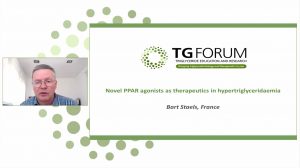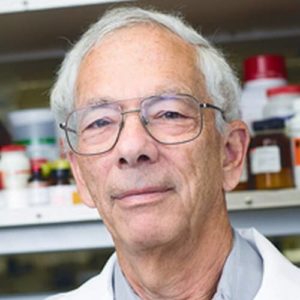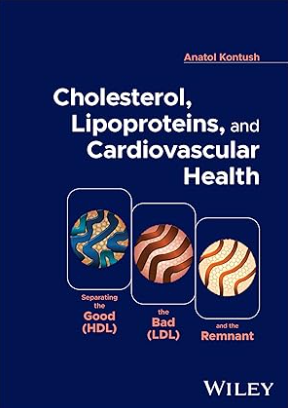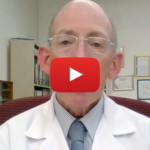Latest »
Eleventh Closed Scientific Expert Meeting of the Editorial Board
Is post-prandial lipaemia an independent risk factor for atherosclerosis?
 Henry Ginsberg, Columbia University Medical Center, New York, USA, …
Henry Ginsberg, Columbia University Medical Center, New York, USA, …
Watch the presentation
Adipose tissue-liver crosstalk: Implication of ANGPTL4 inhibition
 Sander Kersten, Cornell University (USA), …
Sander Kersten, Cornell University (USA), …
Watch the presentation
Expert commentaries
Metabolic fatty liver disease: How are triglycerides involved?
 With metabolic fatty liver disease on the increase, Professor Robert Rosenson (Icahn School of Medicine at Mount Sinai, New York, USA) examines the link with triglycerides, discusses current treatment options and presents encouraging clinical trial data showing reduction in liver fat with novel triglyceride-lowering agents, with implications for future management of patients with this challenging condition.
With metabolic fatty liver disease on the increase, Professor Robert Rosenson (Icahn School of Medicine at Mount Sinai, New York, USA) examines the link with triglycerides, discusses current treatment options and presents encouraging clinical trial data showing reduction in liver fat with novel triglyceride-lowering agents, with implications for future management of patients with this challenging condition.
Read the commentary
ANGPTL4: An important regulator of cholesterol and triglyceride metabolism
 As the first agents targeting ANGPTL4 progress through clinical trials investigating their potential to lower triglyceride levels, Professor Sander Kersten (Cornell University, New York, USA) considers the role of ANGPTL4 in lipid metabolism, its mechanism of action, and latest data supporting the growing interest in ANGPTL4 inhibition as an opportunity for reducing cardiovascular risk.
As the first agents targeting ANGPTL4 progress through clinical trials investigating their potential to lower triglyceride levels, Professor Sander Kersten (Cornell University, New York, USA) considers the role of ANGPTL4 in lipid metabolism, its mechanism of action, and latest data supporting the growing interest in ANGPTL4 inhibition as an opportunity for reducing cardiovascular risk.
Read the commentary
NEWS Updates

SHR-1918 shows promise in homozygous FH The ANGPTL3-targeting agent, SHR-1918, significantly reduced LDL-C, TG, apoB …

Fish oil supplements reduce serious CV events in patients on haemodialysis Patients undergoing maintenance haemodialysis …

2025: A Year of Progress in Triglyceride Research Over the past year, progress in the field of TG research has continued to gain momentum…

Redemplo (plozasiran) receives US approval for FCS The US Food and Drug Administration (FDA) has approved Redemplo (plozasiran) as an …

Tenth Closed Scientific Expert Meeting of the Editorial Board
Should we be lowering TG levels in the range between 150 and 500 mg/dL
and if so, how? Setting the scene
 Gerald Watts, University of Western Australia, Perth, contrasts the TG lowering effects of apoC3 and ANGPTL3 inhibitors and FGF21 analogues in mild-to-moderate hypertriglyceridaemia with the mixed cardiovascular benefits seen with conventional TG-lowering agents in this population. He also highlights the challenge of designing outcome studies of novel agents in patients likely to be using a GLP-1 agonist.
Gerald Watts, University of Western Australia, Perth, contrasts the TG lowering effects of apoC3 and ANGPTL3 inhibitors and FGF21 analogues in mild-to-moderate hypertriglyceridaemia with the mixed cardiovascular benefits seen with conventional TG-lowering agents in this population. He also highlights the challenge of designing outcome studies of novel agents in patients likely to be using a GLP-1 agonist.
Watch the presentation
GLP-1 agonists: Effects on plasma lipid profile?
 Gary Lewis, University of Toronto, Canada, discusses the effects of the incretin hormones, GLP-1 and GIP, on insulin secretion and glucose levels, and the role of incretin-based therapies for obesity treatment, as well as their inhibitory actions on intestinal lipoprotein particle production, independent of changes in body weight, glycaemia, satiety, gastric emptying and pancreatic hormones.
Gary Lewis, University of Toronto, Canada, discusses the effects of the incretin hormones, GLP-1 and GIP, on insulin secretion and glucose levels, and the role of incretin-based therapies for obesity treatment, as well as their inhibitory actions on intestinal lipoprotein particle production, independent of changes in body weight, glycaemia, satiety, gastric emptying and pancreatic hormones.
Watch the presentation
Third Closed Scientific Expert Meeting of the Editorial Board
Keynote: What have we learned from triglyceride lowering trials using fibrates over the past 40 years?
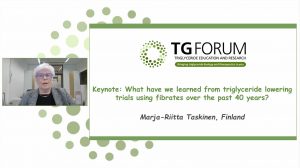
Professor Marja-Riitta Taskinen reviews the evidence from the FIELD and ACCORD clinical trials in type 2 diabetes and considers how treatment might be tailored to patients most likely to benefit.
Expert Commentaries
Triglyceride-rich lipoproteins and their remnants: Commentary on the 2021 EAS Consensus Statement
 Professor Gary Lewis (University of Toronto, Canada) discusses the evidence presented in the 2021 EAS Consensus Statement and its implications for clinicians and patients.
Professor Gary Lewis (University of Toronto, Canada) discusses the evidence presented in the 2021 EAS Consensus Statement and its implications for clinicians and patients.
ASCVD risk with persistent hypertriglyceridaemia: What is the latest guidance from ACC?
 Dr Michael Miller (University of Maryland, Baltimore, USA) discusses the background to the latest ACC guidance and the recommendation to stratify patients for treatment according to their residual LDL-cholesterol level.
Dr Michael Miller (University of Maryland, Baltimore, USA) discusses the background to the latest ACC guidance and the recommendation to stratify patients for treatment according to their residual LDL-cholesterol level.
Clinical trials of innovative therapeutics
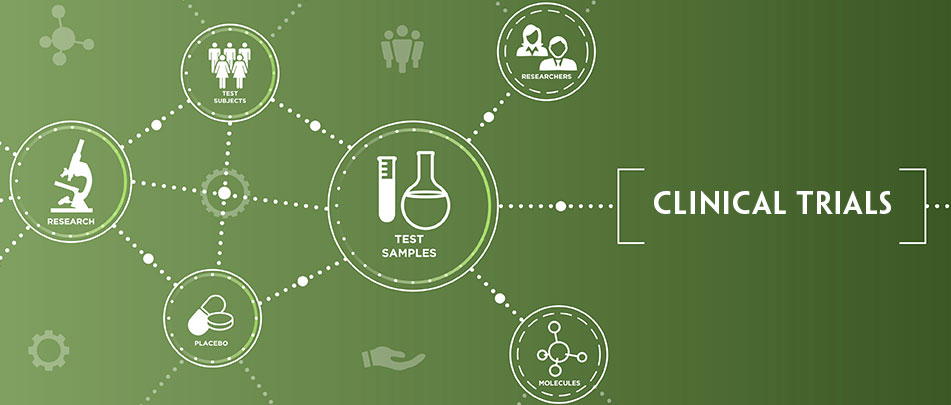
New insights into the biology of triglyceride metabolism underpin the development of novel therapies for managing hypertriglyceridaemia to reduce the risk of atherosclerotic cardiovascular disease (ASCVD) and, for severely elevated levels, pancreatitis.
In the last decade epidemiology and genetic studies – in particular, Mendelian randomisation studies – have moved the field forward and we are on the cusp of a new era in managing elevated triglycerides.
Major outcomes studies with these new therapies are fundamental to answering the much-debated question: Does lowering elevated triglycerides reduce residual cardiovascular risk?
About Triglyceride Forum
The Triglyceride Forum is a unique, independent, expert-led global initiative to address the rapidly evolving field of triglycerides and triglyceride-rich lipoproteins in cardiovascular disease and pancreatitis. This Forum will provide clinicians and researchers with international, open access, peer-reviewed resources at an important time when new and innovative molecules are at advanced stages of development… Read more >>
Why join?
 Professors Ginsberg and Chapman explain the fundamental scientific and clinical research that has turned the spotlight on triglyceride-rich lipoproteins and their remnants as important players in the development of atherosclerotic CVD and pancreatitis and as targets for novel therapies for both these serious diseases.
Professors Ginsberg and Chapman explain the fundamental scientific and clinical research that has turned the spotlight on triglyceride-rich lipoproteins and their remnants as important players in the development of atherosclerotic CVD and pancreatitis and as targets for novel therapies for both these serious diseases.
FREE MEMBERSHIP
 Join the Triglyceride Forum for open access to independent, evidence based knowledge and high quality educational programmes
Join the Triglyceride Forum for open access to independent, evidence based knowledge and high quality educational programmes
View invitation from Henry Ginsberg
 Join the Triglyceride Forum to share new data and exchange opinions with clinicians and researchers around the world
Join the Triglyceride Forum to share new data and exchange opinions with clinicians and researchers around the world
View invitation from John Chapman
Meet our Steering Committee
Educational partners and supporters





